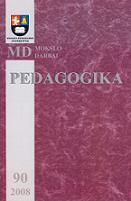Gėris kaip vertybė ugdymo realybėje
The Value of Good Within the Education Practice
Author(s): Dalia Marija StančienėSubject(s): Education
Published by: Vytauto Didžiojo Universitetas
Keywords: good; values; education practice; social relations; internalization
Summary/Abstract: Contemporary social and political transformations pose new tasks for the science of education. The permanently increasing number of crimes, suicides and mental cases indicates the signifieant deformation of interpersonal relations. In order to counterbalance these deformations, new approaches to the personality upbringing are necessary. The value of good has to play the leading role in the education process. In the contemporary theory of education there are two contrary approaches to the good. One of them places the good and other spiritual values to the center of education process, the other - to its periphery. Each of these approaches presupposes different method. The first underlines direct internalization of the spiritual values, the second relays on technology, by means of which the values are indirectly internalized. The both aim at the same - the upbringing of mature personality as a protagonist and defender of spiritual values in the consumer society. The propagation of the value of good implies activity on metaphysical, ethical and physical level on these levels the functional hierarchy of values depends on the educator's approach to the value of good and determines the method of its internalization in pupil's consciousness and display in his / her behavior, first of all in his / her interpersonal relations. Michel foucault genealogically inquires the process of the alienation of sovereign personality and the role of disciplinary institutions in it. He focuses attention on the development of these institutions, on their bureaucratic (anonymous) functioning and influence over personality by specific coercive forms and procedures, aimed at mak-ing a person useful to society as much as possible. In this process the cooperation of the institutions of knowledge and power is extremely important. They cooperate in giving social and personal identity to man, in transforming subject into object, and separating it from itself as well as from others. He underlines that the standardization and socialization of personality is mostly performed in educational, medical and penitentiary institutions. Neglecting the paradigm of goodness in the education practice means demoralization and depersonalization of pupil which inevitably contribute to the corruption of social relations and leads to social crisis.
Journal: Pedagogika
- Issue Year: 2008
- Issue No: 90
- Page Range: 44-48
- Page Count: 5
- Language: Lithuanian

